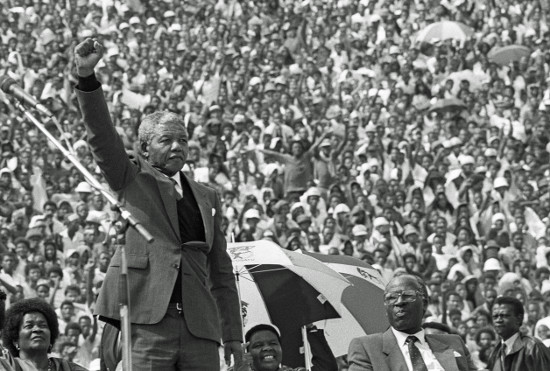“Friends, Comrades and fellow-South Africans, I greet you all in the name of peace, democracy and freedom for all. I stand here before you not as a prophet, but as a humble servant of you the people. Your tireless and heroic sacrifices have made it possible for me to be here today - I therefore place the remaining years of my life in your hands”.

With these words, on 11 February 1990, Nelson Rolihlahla Mandela opened his first speech as a free man, 10 050 days after being imprisoned for fighting against apartheid. Mandela’s release was the one of the first in a series of tentative and often frustrating steps, as he began the discussions of how South Africa would move away from apartheid’s racial oppression and minority rule.
On his return to Soweto on 13 February 1990, Mandela was frank about the challenges that lay ahead, and the work that needed to be done to address problems brought about by apartheid’s structural inequality:
“My return to Soweto fills my heart with joy. At the same time I return with a deep sense of sadness. Sadness to learn that you are still suffering under an inhuman system. The housing shortage, the schools crisis, unemployment and the crime rate still remain”.
In 1990, Mandela was also forced to address the issue of continuing factional violence, and the tensions that rode high amongst supporters of the Inkatha Freedom Party, the United Democratic Front and the African National Congress. On 25 February, Mandela made his way to Durban, where he made an impassioned plea for unity and peace:
“In Natal, apartheid is a deadly cancer in our midst, setting house against house, and eating away at the precious ties that bind us together. This strife amongst ourselves wastes our energy and destroys our unity. My message to those of you involved in this battle of brother against brother is this: take your guns, your knives, and your pangas, and throw them into the sea. Close down the death factories. End this war now!”
A task that Mandela also prioritised in his first months of freedom was visiting the bantustans, and explaining that while incorporation into the new South Africa would not be forced, the bantustan system itself was undemoctratic and unsustainable. In his speech on 22 April 1990, at an ANC rally in Umtata, Transkei, Mandela explained his views:
“The apartheid system of government and its Bantustan administrations are not based on the will of the people: they are the result of the greed and undemocratic practices of a racist minority. Therefore, they are undemocratic and illegitimate and cannot claim authority on the people of South Africa”.
Read the full text of all of Mandela’s speeches quoted above by visiting SAHA’s United Democratic Front (UDF) Collection.
And Mandela was also faced with the mammoth task of negotiating a political transition with the National Party – where trust and good faith were not always present. Mandela’s feelings about the negotiations for democratic South Africa were well articulated in a speech he gave at the opening of the appropriately-named Obstacles Meeting of 2 May 1990, in Cape Town:
“This is the first time in 78 years that a truly serious meeting takes place between delegations of the African National Congress and the succession of white governments that have ruled our country for generations. This is a fact that is sobering in its implications”.
Read the full text of Mandela’s speech at the Obstacles meeting in the Original SAHA Collection.
As the 25th anniversary of Mandela’s release arrives, it is important to remember the competing interests, myriad problems and extremely challenging political environment Madiba was forced to navigate after his release from prison. Acknowledging this, the elections of 1994 appear miraculous indeed, and Mandela’s efforts to broker them, greater still.
Mandela wasn’t perfect, and in his efforts to reunite a factionalised and traumatised country, he made mistakes. He was also unable to solve South Africa’s long list of issues, many of which continue to plague us today. It is prescient to note that many of the problems he raised in his address to Sowetans continue to weigh down communities around the country, 25 years later.
What Mandela brought to South African governance was grit – the ability to focus on a goal, and pursue it without wavering. In spite of opposition and hindrance, Mandela’s aim of a democratic election, and thereafter the development of a non-racial South Africa, took shape. In his own words, on 13 February 1990:
“We are going forward. The march towards freedom and justice is irreversible. I have spoken about freedom in my lifetime. Your struggles, your commitment and your discipline has released me to stand here before you today. These basic principles will propel us to a free non-racial democratic united South Africa, that we have struggled and died for”.
Such focused determination on the realisation of democratic ideals is what drove Mandela and South Africa forward. Such focused determination is what is needed to continue to address South Africa’s contemporary struggles for justice, truth and reconciliation.





